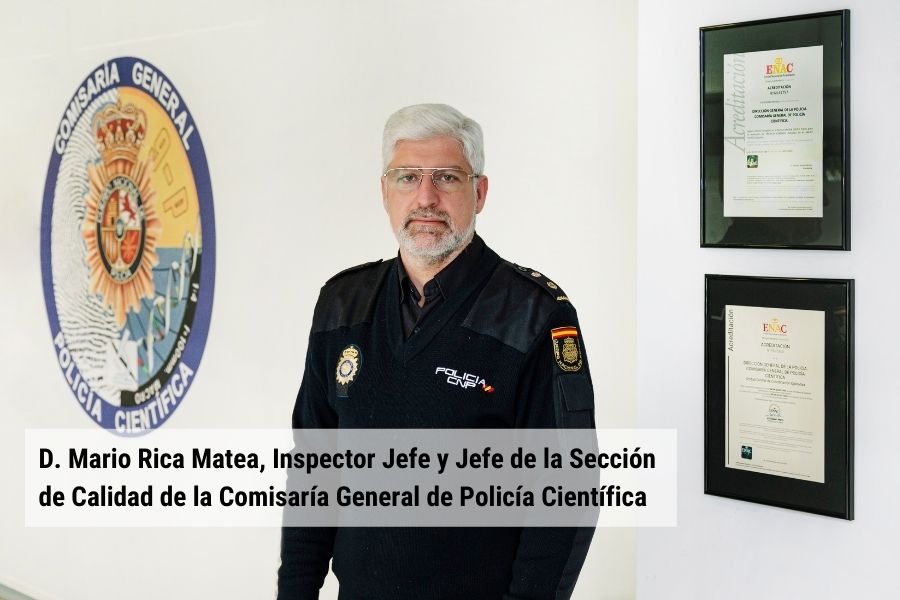enac-police-forensic-inspection
ENAC accredits the Spanish National Police Corps Scientific Police for crime scene technical police inspections

The Central Unit for Scientific and Technical Research (Unidad Central de Investigación Científica y Técnica, UCICT) of the Spanish General Commissariat of Scientific Police (Comisaría General de Policía Científica) continues to expand its accreditation scope, incorporating accreditation, this time working together with the Central Unit for Operational Coordination (Unidad Central de Coordinación Operativa, UCCO), in accordance with the ISO 17020 standard for performing crime scene technical police inspections, a scheme developed in collaboration with security institutions and bodies.
Mario Rica Matea, the General Scientific Police's Chief Inspector and Head of Quality, explains in this interview the importance of having accreditation to carry out technical police inspections, an initial part of the forensic scientific process, starting the moment a scientific police team's presence is required to inspect the crime scene.
The General Commissariat of Scientific Police has for years relied on its forensic analysis laboratory accreditation, what benefits has it brought you?
The main benefit of being accredited by the UNE-EN ISO/IEC 17025 for different activities, has been to reinforce confidence in our results reports in terms of their assessment in court and the exchange of data with other national and international police forces. It's evident in the security our staff feels when called to orally testify in relation to these reports, especially due to the support provided by an ENAC-accredited quality system. Moreover, internationally, it is important to be part of forensic networks such as the European network ENFSI, which requires accreditation in forensic specialties related to identification (Lofoscopy and DNA) and the recommendation to have such accreditation, likewise for all other specialties each institution develops, as well as in the police technical eye inspection.
On this occasion, you have received ENAC’s accreditation for crime scene technical police inspections. How important are these inspections in the forensic scientific process?
Technical police inspections (inspecciones técnico-policiales, ITP), also known as eye inspections, are the cornerstone of the forensic process. The principle that in a criminal act, there is always some transfer between the three basic elements of a crime - the place of the act, the victim, and its author, forces us to carry out the best possible ITP. Carrying out this inspection under standardized and accredited protocols in accordance with an internationally recognized standard provides extra confidence in the final results, and improves the rest of the investigation steps, both from the point of view of the police forensic process (analytics that must be carried out on the traces collected), by discarding from the start implausible options or those not subject to scientific method or that would unnecessarily consume resources.
Why do you consider it necessary to accredit these inspection services?
Precisely because of the two data advances mentioned: the ITP, as the main basis of the forensic process, and the EU-recommended international recognition to develop and implement an area of forensic science throughout the EU. After more than 10 years of having accredited forensic laboratory activities, we understood that the time had come to comply with EU recommendations and judicial guarantees. Everything pushed us to seek the initial process' accreditation where the traces arriving at the laboratories were to be analyzed with accredited protocols and that is what we did.
Why have you decided to apply for accreditation now?
First of all, there was a serious lack of knowledge of the ISO 17020 in the forensic field. It is not exactly an easy standard to adapt to this context and, although different organizations have published guides and recommendations in this regard, addressing the setting up of a quality system based on the standard and accrediting it seemed too complex a challenge.
Moreover, the EU recommendation on these inspections' accreditation did not occur until it had consolidated accreditation according to the ISO 17025 standard of DNA analysis and Fingerprint Identification in most countries, something that did not occur until after 2015. The third factor that influenced the final decision was that the ISO 272 committee was beginning to develop ISO 21043 referring to the entire forensic process, from its start in eye inspections to its completion with the court declaration. Part 2 of ISO 21043 (Recognition, registration, collection, transport, and storage of items) is expressly dedicated to the conditions and requirements that must be met in an ITP, it was published in 2018, translated into Spanish and finally published in 2020. In summary, the General Commissariat of Scientific Police considered it convenient to start the ITP accreditation path with safe steps after consolidating these aspects, and so, it is now that we have addressed it.
Accreditation News
Accreditation News is published quarterly and sent to organizations and to people who have asked to be included on its mailing list.
Would you like to receive a free copy of Accreditation News? Subscribe here.

